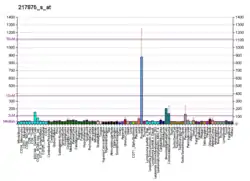TMEPAI
Transmembrane prostate androgen-induced protein is a protein that in humans is encoded by the PMEPA1 gene.[5][6]
References
- GRCh38: Ensembl release 89: ENSG00000124225 - Ensembl, May 2017
- GRCm38: Ensembl release 89: ENSMUSG00000038400 - Ensembl, May 2017
- "Human PubMed Reference:". National Center for Biotechnology Information, U.S. National Library of Medicine.
- "Mouse PubMed Reference:". National Center for Biotechnology Information, U.S. National Library of Medicine.
- Xu LL, Shanmugam N, Segawa T, Sesterhenn IA, McLeod DG, Moul JW, Srivastava S (Jun 2000). "A novel androgen-regulated gene, PMEPA1, located on chromosome 20q13 exhibits high level expression in prostate". Genomics. 66 (3): 257–63. doi:10.1006/geno.2000.6214. PMID 10873380.
- "Entrez Gene: TMEPAI transmembrane, prostate androgen induced RNA".
- Xu LL, Shi Y, Petrovics G, Sun C, Makarem M, Zhang W, Sesterhenn IA, McLeod DG, Sun L, Moul JW, Srivastava S (Aug 2003). "PMEPA1, an androgen-regulated NEDD4-binding protein, exhibits cell growth inhibitory function and decreased expression during prostate cancer progression". Cancer Research. 63 (15): 4299–304. PMID 12907594.
Further reading
- Jolliffe CN, Harvey KF, Haines BP, Parasivam G, Kumar S (Nov 2000). "Identification of multiple proteins expressed in murine embryos as binding partners for the WW domains of the ubiquitin-protein ligase Nedd4". The Biochemical Journal. 351 Pt 3 (3): 557–65. doi:10.1042/0264-6021:3510557. PMC 1221394. PMID 11042109.
- Rae FK, Hooper JD, Nicol DL, Clements JA (Sep 2001). "Characterization of a novel gene, STAG1/PMEPA1, upregulated in renal cell carcinoma and other solid tumors". Molecular Carcinogenesis. 32 (1): 44–53. doi:10.1002/mc.1063. PMID 11568975. S2CID 46602128.
- Brunschwig EB, Wilson K, Mack D, Dawson D, Lawrence E, Willson JK, Lu S, Nosrati A, Rerko RM, Swinler S, Beard L, Lutterbaugh JD, Willis J, Platzer P, Markowitz S (Apr 2003). "PMEPA1, a transforming growth factor-beta-induced marker of terminal colonocyte differentiation whose expression is maintained in primary and metastatic colon cancer". Cancer Research. 63 (7): 1568–75. PMID 12670906.
- Xu LL, Shi Y, Petrovics G, Sun C, Makarem M, Zhang W, Sesterhenn IA, McLeod DG, Sun L, Moul JW, Srivastava S (Aug 2003). "PMEPA1, an androgen-regulated NEDD4-binding protein, exhibits cell growth inhibitory function and decreased expression during prostate cancer progression". Cancer Research. 63 (15): 4299–304. PMID 12907594.
- Giannini G, Ambrosini MI, Di Marcotullio L, Cerignoli F, Zani M, MacKay AR, Screpanti I, Frati L, Gulino A (Dec 2003). "EGF- and cell-cycle-regulated STAG1/PMEPA1/ERG1.2 belongs to a conserved gene family and is overexpressed and amplified in breast and ovarian cancer". Molecular Carcinogenesis. 38 (4): 188–200. doi:10.1002/mc.10162. PMID 14639658. S2CID 22894125.
- Lim J, Hao T, Shaw C, Patel AJ, Szabó G, Rual JF, Fisk CJ, Li N, Smolyar A, Hill DE, Barabási AL, Vidal M, Zoghbi HY (May 2006). "A protein-protein interaction network for human inherited ataxias and disorders of Purkinje cell degeneration". Cell. 125 (4): 801–14. doi:10.1016/j.cell.2006.03.032. PMID 16713569. S2CID 13709685.
This article is issued from Wikipedia. The text is licensed under Creative Commons - Attribution - Sharealike. Additional terms may apply for the media files.




